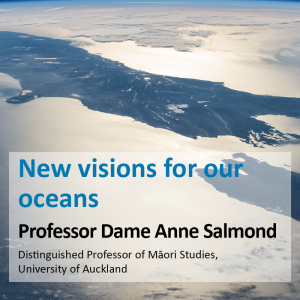Each day during the month of April, the Institute will feature one of the 30 ‘perspectives’ from the One Ocean report. These short articles include a diverse range of views regarding oceans management in New Zealand. Enjoy!
Today:
Professor Dame Anne Salmond, Distinguished Professor of Māori Studies, University of Auckland
New visions for our oceans
In recent times what we have seen is the high seas, mare liberum, formerly an expanse free to all nations but belonging to none, shrinking as nation states expand their sphere of influence out from their coastlines – a kind of oceanic enclosure. Such cartographic visions of the sea embody particular assumptions about the world and an abstract, quantifying, controlling and commodifying logic that is still unfolding.
In New Zealand, as elsewhere, a radical division between nature and culture, born of the ‘order of things’ out of the Enlightenment and the belief that nature is there for human beings to exploit without limit (and that they can fix any damage they do, because they rule the cosmos) is fundamentally destructive to maritime ecosystems. Contemporary scientific models with their fragmented partitions and the split between nature and culture, with its deep separation between people and other phenomena, are failing to adequately grasp the cascading dynamics of complex systems in which people are implicated at every scale, putting the future of many marine species and coastal human communities at risk simultaneously. Until we grasp that our being and that of oceanic ecosystems are bound together … we won’t demand that the human activities that put our futures at risk are conducted within survivable limits.
So just as Marcel Mauss reflected on the Māori idea of the hau to imagine alternatives to a commodified world, cross-philosophical experiments may give us the freedom (and I think New Zealand is a perfect place to do this) to generate more adaptive ways of being and of ordering our relations with each other and with the ocean.
Excerpt from ‘The Sea’, presented in October 2020 in Tauranga as part of the Royal Society of New Zealand’s 2020 Rutherford Lectures.






















![20160906 McGuinness Institute - TacklingPovertyNZ Workshop – Far North Flyer [FINAL]](/wp-content/uploads/20160906-McGuinness-Institute-TacklingPovertyNZ-Workshop-%E2%80%93-Far-North-Flyer-FINAL-1-50x50.png)